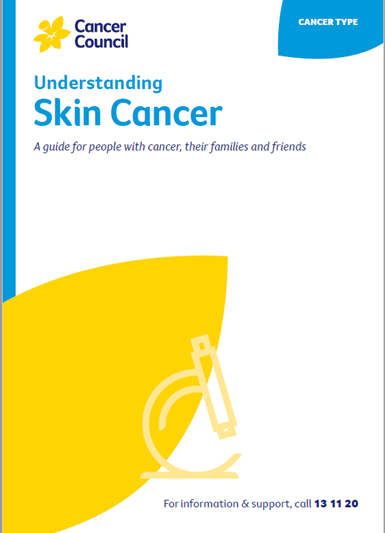- Home
- Skin cancer
- Life after treatment
- Changes to your appearance
Changes to your appearance
Skin cancer treatments such as surgery, curettage and electrodesiccation, and cryotherapy often leave a scar. In most cases, your doctor will do everything they can to make the scar less noticeable. Most scars will fade with time. Skin treated with radiation therapy may change in colour, and appear lighter or darker depending on your skin tone. Talk to your radiation therapy team about the best options for skincare.
Talk to your doctor or nurse about treatments that can help improve the appearance of scars, such as silicone gels and tapes and non-perfumed creams (e.g. sorbolene). Steroid injections to flatten out lumpy scars may also be an option for some people.
You may worry about how any scars look, especially on your face. Cosmetics can help cover scarring. Your hairstyle or clothing might also cover the scar. You may want to talk to a counsellor, friend or family member about how you feel after changes to your appearance.
For more on this, see Emotions and cancer.
Look Good Feel Better
Look Good Feel Better is a national program that helps people manage the appearance-related effects of cancer treatment. Workshops are run for men, women and teenagers. For information about services in your area, call 1800 650 960.
I had skin cancer removed from my left forearm, followed by a skin graft, with the donor area from inside the upper part of the same arm. I now have a large ‘indent’ from the removal of the cancer and a large scar at the donor site. I did not expect the amount of pain and appearance changes.
David
Podcast for people affected by cancer
Listen now
A/Prof Victoria Mar, Director, Victorian Melanoma Service, Alfred Hospital and Monash University, VIC; Tracey Bilson, Consumer; Raelene Buchan, Consumer; Alison Button-Sloan, Consumer; Dr Margaret Chua, Radiation Oncologist, and the Skin Radiation Oncology team, Peter MacCallum Cancer Centre, VIC; Prof Anne Cust, Deputy Director, The Daffodil Centre, The University of Sydney and Cancer Council NSW, Chair, National Skin Cancer Committee, Cancer Council, and faculty member, Melanoma Institute Australia; A/Prof Paul Fishburn, Skin Cancer Doctor, Norwest Skin Cancer Centre, NSW and Faculty of Medicine, University of Queensland; Danielle Goss, Melanoma Clinical Nurse Specialist, Amie St Clair Melanoma (part of Melanoma Institute Australia), Wagga Wagga, NSW; Louise Pellerade, 13 11 20 Consultant, Cancer Council WA: Dr Shireen Sidhu, Head of Dermatology, The Royal Adelaide Hospital, SA; Dr Amelia Smit, Research Fellow – Melanoma and Skin Cancer, The Daffodil Centre, The University of Sydney and Cancer Council NSW; Dr Tony Tonks, Plastic and Reconstructive Surgeon, Canberra Plastic Surgery, ACT.
View the Cancer Council NSW editorial policy.
View all publications or call 13 11 20 for free printed copies.
